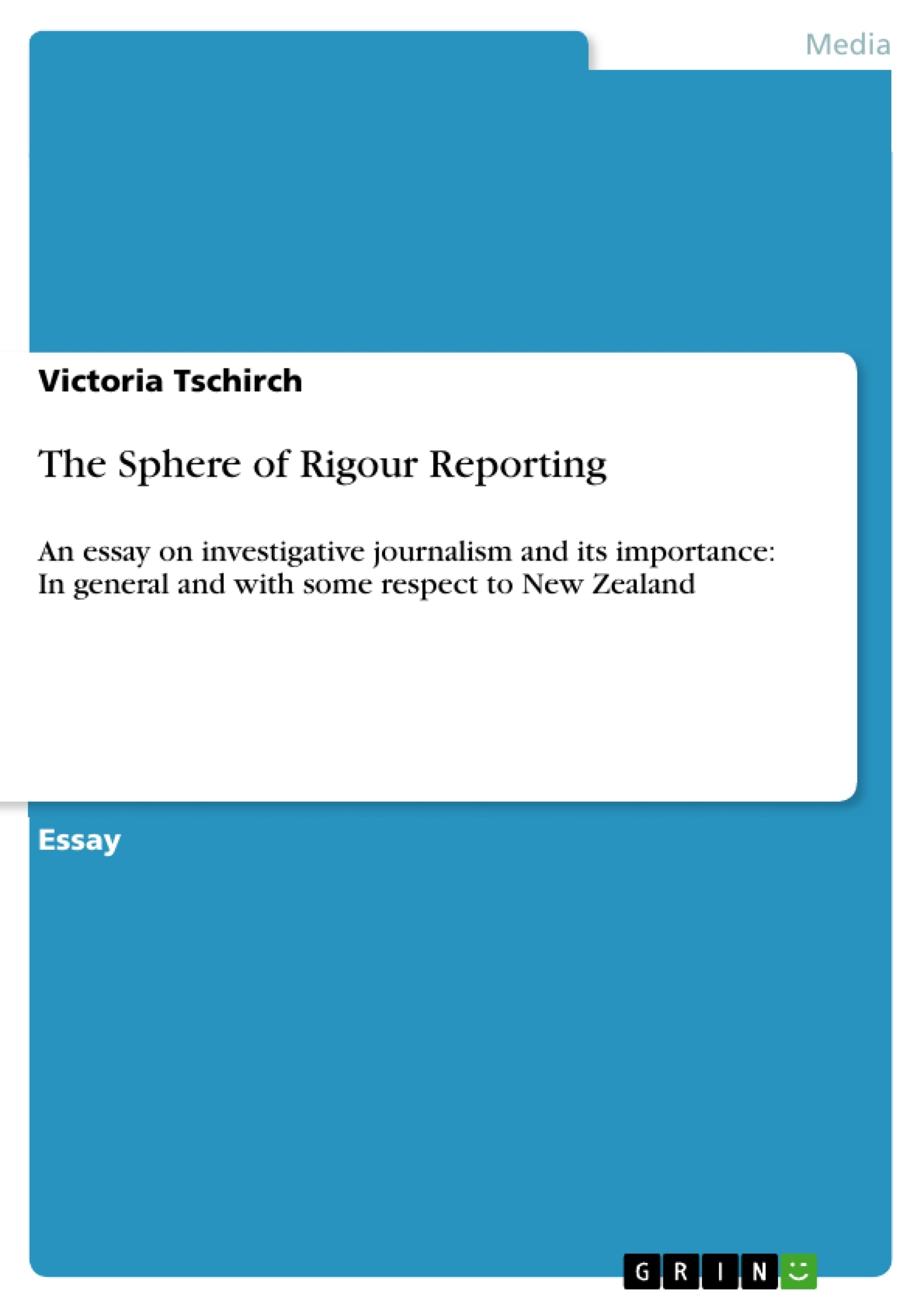This research paper presents a mosaic of powerful quotes and reflections in relation with investigative journalism. The ultimate aim is to explain the importance of investigative journalism – a phrase that is used interchangeably with rigour reporting and agenda-setting journalism further on, despite differing nuances in academics. Also, some of the presented reports and stories are not necessarily perceived as purely investigative pieces of writing, they do however exhibit characteristics of investigative journalism to some extent.
It is not compulsory to be intensely involved and informed about journalism as a style of writing or as some say religion (Njawe, 2006), since the maxima of journalism do not only apply to the reportage but to every aspect of a strong journalist’s life, in order to pursue the argumentation of this paper. Further, the quantity of references serve partly as proof of the presented argumentation while on the other hand invites for further reading. Classical synopses of muckraking stories and investigative journalistic achievements are rather kept short and serve as a basis for further examinations on rigour reporting. Moreover, the focus is on the effects of investigative journalism, consequences in state of its absence and eventually its importance. The soul of investigative journalism has been described in a myriad of ways. An adequate introduction into the topic, without consulting the “big three investigation
units” – the Watergate Affair, the Pentagon Papers and Ida Tarbell’s merits – is a comment by Gene Roberts, an American journalist who was executive editor of The Philadelphia Inquirer and managing editor of The New York Times.
Inhaltsverzeichnis (Table of Contents)
- Introduction
- Investigative Journalism
- Muckrakers
- Analysis
- Media Trends
- Barriers
- Consequences of Absence
- Challenges
- Conclusion
- References
Zielsetzung und Themenschwerpunkte (Objectives and Key Themes)
This research paper examines the importance of investigative journalism, also referred to as rigour reporting and agenda-setting journalism. The paper explores the historical context, key characteristics, and challenges faced by investigative journalists. It also discusses the consequences of its absence and its overall impact on society. Key themes include:- Defining investigative journalism and its purpose.
- Analyzing the historical role of muckrakers in exposing corruption and social injustice.
- Exploring the challenges and barriers faced by investigative journalists in the contemporary media landscape.
- Examining the impact of investigative journalism on public awareness, policy change, and societal reform.
Zusammenfassung der Kapitel (Chapter Summaries)
The introduction provides an overview of investigative journalism and its significance. It outlines the paper's aim, emphasizing the importance of rigour reporting and its role in shaping public discourse. The chapter also introduces key concepts and terms related to investigative journalism, drawing upon historical examples and prominent voices in the field.
Chapter 2 delves into the definition and scope of investigative journalism. It examines the distinguishing characteristics of this form of journalism, contrasting it with other journalistic practices. The chapter explores the ethical considerations and the unique challenges that investigative journalists face in their pursuit of truth and accountability.
The chapter on muckrakers explores the historical role of investigative journalism in exposing corruption and social injustice. It examines the work of influential muckrakers, highlighting their impact on societal change and the development of investigative journalism as a force for public accountability.
Schlüsselwörter (Keywords)
The key terms and concepts discussed in this paper include: investigative journalism, rigour reporting, agenda-setting journalism, muckrakers, media trends, barriers to investigative journalism, consequences of its absence, challenges to investigative journalism, and its overall importance.Frequently Asked Questions
What is the core definition of investigative journalism in this paper?
It is defined as "rigour reporting" or "agenda-setting journalism," focusing on in-depth research to expose corruption and social injustice.
Who were the "muckrakers"?
Muckrakers were influential early 20th-century journalists who specialized in exposing social ills, corporate greed, and political corruption to trigger societal reform.
What are the main barriers to investigative journalism today?
The paper identifies media trends, financial constraints, and institutional barriers as significant challenges for contemporary investigative units.
What happens if investigative journalism is absent?
The absence of rigour reporting can lead to a lack of public accountability, unchecked corruption, and a failure to inform the citizenry about critical issues.
Which famous investigative cases are discussed?
The paper references the "big three": the Watergate Affair, the Pentagon Papers, and Ida Tarbell’s investigations into Standard Oil.
Why is investigative journalism compared to a "religion" by some?
This refers to the intense commitment and ethical maxima that investigative journalists often apply to every aspect of their lives to pursue the truth.
- Quote paper
- Victoria Tschirch (Author), 2008, The Sphere of Rigour Reporting, Munich, GRIN Verlag, https://www.grin.com/document/116903



